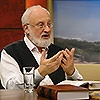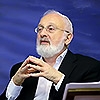“Cajoling Jew-Haters Does Not Abate Antisemitism” (Times of Israel)

Michael Laitman, On The Times of Israel: “Cajoling Jew-Haters Does Not Abate Antisemitism”
Earlier this week, I wrote about the new report by the policy planning think tank Jewish People Policy Institute (JPPI) that revealed the depth of antisemitism on the Left and how dangerous it is. In that post, I intentionally left out the most troubling part of the report, which it defined as “Jewish communal disunity.” Our worst enemy is not this or that person who hates Jews; our worst enemy is our own hatred for each other.
According to the report, much of the Jewish establishment urged the Biden administration to make the adoption of the IHRA definition of antisemitism a national priority, in line with most western countries and the official policy of the UN. However, while this was happening, “key progressive Jewish groups lobbied the administration against its adoption.” Moreover, “Jewish anti-Zionists play increasingly prominent roles in left-wing policy and discourse arenas.”
During the Spanish Inquisition, our worst detractors and persecutors were former Jews. In the 1930s, there were German Jews and Jewish organizations that joined the Third Reich and fully endorsed its racist ideology and policy against Jews. There have always been Jews who joined Jew-haters, thinking that by doing so, they will save their skins. It has always made things worse for the Jews, much worse.
In fact, the majority of arguments that antisemites use against Jews come to them from self-hating Jews. They provide Jew-haters with ammunition in the form of arguments against Jews, advise them how to use it against Jews effectively, and chant along with them their venomous slogans. Self-hating Jews portray Jew-haters as victims in order to justify their antisemitism and their violence against Jews.
Hoping to win the hearts of our enemies, antisemitic Jews become more sinister and malicious toward Jews than any non-Jew antisemite could ever be. Gentile antisemites feel a visceral anger toward us. Jewish antisemites make hating Jews an ideological issue, and ideologies are those responsible for genocides, not gut hatred.
I can understand the hatred of some Jews for their own people. It is not easy being born into a group that is always held responsible for everything that is wrong with the world. However, joining the ranks of the detractors does not relieve us from our duty. On the contrary, it only deepens the haters’ loathing and makes them more aggressive.
The only cure to Jew-hatred is for Jews to care for one another. The gut feeling of antisemites that the Jews are responsible for the problems in the world is correct, but self-hatred among Jews does not save the haters, it exacerbates the hatred of non-Jews. The “fault” of the Jews is not that they are harming the world on purpose, but that they are divided, contrary to their mission—to be a model of unity.
There is a reason why our Hebrew ancestors conceived such sublime notions as mutual responsibility, charity, mercy, and loving others as ourselves. They not only envisioned these ideas, they also tried to live them out. When they succeeded, our nation thrived; when they failed, our nation suffered.
Possibly the worst antisemite in American history, Henry Ford, inserted many phrases in his antisemitic compilation, The International Jew: The World’s Foremost Problem, which seem to contradict his anti-Jewish narrative. Among them is this intriguing statement: “Modern reformers, who are constructing model social systems, … would do well to look into the social system under which the early Jews were organized.”
We, too, must return to our roots, to the ideology that had fashioned us into a nation. We must strive to love each other above all our differences and all the hatred that may surface between us. Only when we unite are we a model nation. Therefore, only when we unite does the world embrace us.
Any division among us, for whatever reason, aggravates antisemitism because division among us contradicts the calling and mission of our people. The gut feeling that antisemites feel will change from hate to love no sooner than when we rise above our division and unite despite our mutual abhorrence.
—
For more on antisemitism and its history, read my books, New Antisemitism: Mutation of a Long-lived Hatred, and The Jewish Choice: Unity or Anti-Semitism.
[304062]






 Michael Laitman, On Quora:
Michael Laitman, On Quora:





